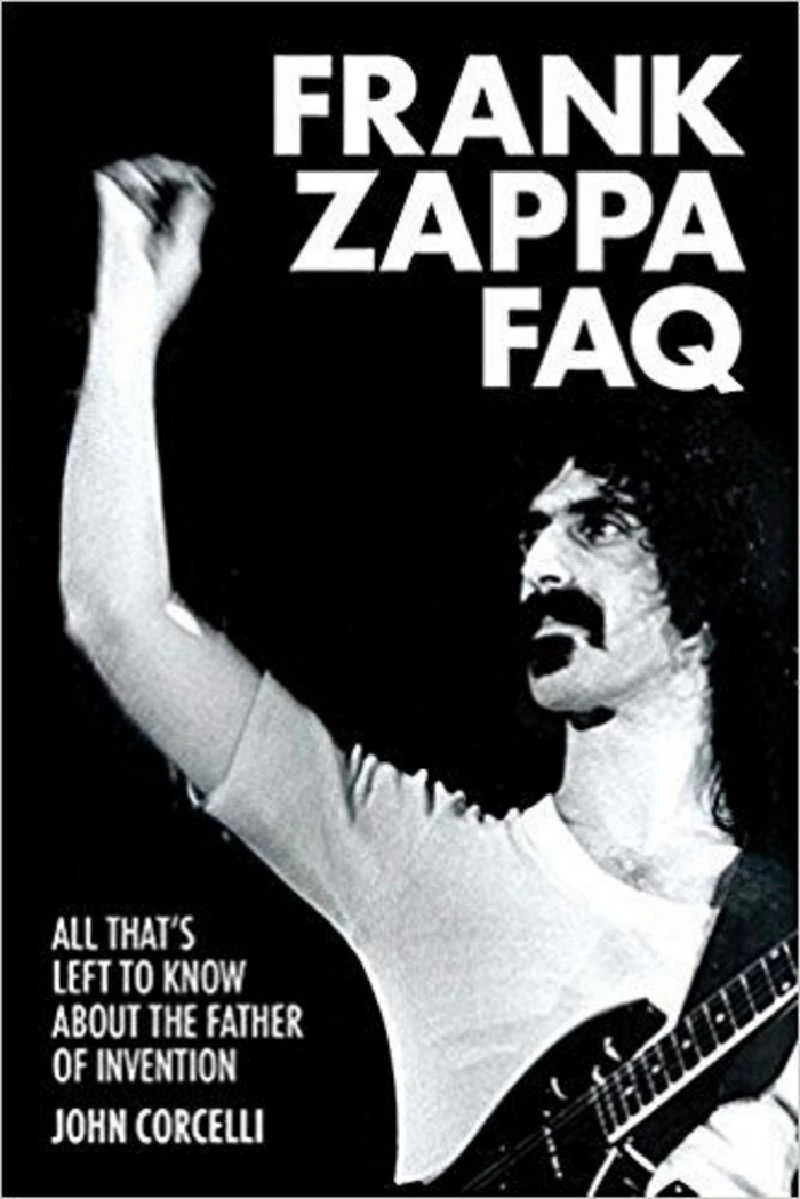Frank Zappa - FAQ: All That’s Left To Know About The Father Of Invention
by Lisa Torem
published: 19 / 4 / 2017

intro
In her 'Raging Pages' book column Lisa Torem finds that John Corcelli's new book 'Frank Zappa FAQ: All That’s Left to Know About the Father of Invention' highlights the American composer's complex compositions and legacy
John Corcelli’s 276-plus page book includes a detailed discography and an intelligent break down of American composer/guitarist/producer Frank Zappa’s extraordinary career. Early on, we get a good picture of everyday living: the musician was born to Sicilian/French parents in Baltimore, Maryland. Because he suffered from asthma, his family moved to Florida, but came back for familial reasons. Ill health meant he was often housebound, so young Frank immersed himself in science experiments, using beakers that his chemist father brought home from his laboratory. In 1965, Zappa was working at Studio Z in California, when he was offered the job of lead guitarist for t-he Soul Giants. The band barely made ends meet doing “Top 40” songs, so Zappa persuaded them to perform his own material and to change the band name to “The Mothers of Invention.” The decision to concentrate on originals displeased local club owners who saw an immediate drop in dance activity, but that decision certainly paved the way for a one-off future; the band cultivated the carefree Californian youth known as “the freaks,” who craved experiential music in the mid 1960s. The author goes on to examine the eclectic collaboration between Zappa and Captain Beefheart, and the emotional challenges they faced while recording a couple of albums, most notably, ‘Trout Mask Replica’ (1969). The first line-up was: Frank Zappa, Roy Estrada, Jimmy Carl Black and Ray Collins. The following year, the band graduated to eight and maded ‘Freak Out,’ ‘We’re Absolutely Free’ and ‘We’re Only in It for The Money’. By 1969, the band had run its course. Zappa’s family gets its fair due. His son, Dweezil, a talented guitarist/arranger in his own right, performs his father’s original compositions on tour, hoping to introduce a younger generation to his father’s music. To illustrate the diversity of his subject’s talents, there are chapters on video and TV appearances and a deep analysis of the man’s recordings. Beyond that, Zappa’s fight against musical censorship depicts a deep, articulate thinker who goes on to challenge conservative viewpoints during a heated congressional hearing. In addition, there is Frank, the psychic, who Rykodisc founder Don Rose referred to as “a forward-thinking artist who controlled his own material and was already digital-friendly” in Billboard, May, 1990. Corcelli stresses the point that when Zappa remastered his albums from vinyl to CD, he made sure the conversion involved an enhancement of or variation on the primary arrangement. Corcelli beautifully described how Zappa’s comfort with the Synclavier opened him up to develop more complicated themes on state-of-the art digital equipment. The photos were limited and sometimes difficult to decipher, but the overall information in this book os conveyed smoothly and intelligently.
Also In Raging Pages
Alice Cooper (2015)
Beatles (2022)
Benjamin Orr (2018)
Bernard Purdie (2015)
Billy Bragg (2017)
Billy J. Kramer (2016)
Bob Boilen (2016)
Bob Dylan (2018)
Bob Marley (2019)
Brian Wilson (2017)
Byrds (2024)
Cher (2025)
Clive Davis (2015)
Common (2020)
Damned (2021)
Don Short (2020)
Donovan (2022)
Elliott Murphy (2019)
Elvis Costello (2015)
Felix Cavaliere (2022)
Flip Side (2025)
Frank Sinatra (2023)
Gary Wright (2014)
Gene Simmons (2015)
Geoff Emerick (2018)
George Harrison (2022)
George Martin (2019)
Green Day (2019)
Holger Czukay (2025)
Ian Mclagan (2016)
Iron Maiden (2014)
Jann Wenner (2019)
Jerry Lee Lewis (2015)
Jerry Nolan (2018)
Jim Summaria and Mark Plotnick (2019)
Jimmy Webb (2022)
Joe Perry (Aerosmith) (2014)
John Lennon (2017)
Kinks (2014)
Lani Hall Alpert (2019)
Laurence Juber (2014)
Liberty DeVitto (2021)
Lisa Robinson (2021)
Lita Ford (2021)
Little Anthony (2014)
Louise Harrison (2015)
Luke Haines (2024)
Manic Street Preachers (2017)
Mary Wilson (2021)
Michael Bloomfield (2020)
Michael Dorf (2019)
Miscellaneous (2014)
Ozzy Osbourne (2014)
Pamela Des Barres (2017)
Peter Doherty (2014)
Radiohead (2022)
Renee Rosen (2018)
Richard Balls (2018)
Rick Wakeman (2023)
Ringo Starr (2015)
Robby Krieger Band (2022)
Roger Daltrey (2020)
Rolling Stones (2016)
Ronnie Wood (2015)
Roy Bond (2023)
Sam Phillips (2018)
Sean Madigan Hoen (2014)
Silas House (2020)
Spencer Vignes (2017)
Spirit (2023)
Suzi Quatro (2023)
Sylvain Sylvain (2018)
Thin Lizzy (2016)
Tommy James (2021)
Tommy Mottola (2025)
Tori Amos (2020)
U2 (2021)
Who (2014)
Will Romano (2015)
Woody Woodmansey (2018)
Zz Top (2014)
Band Links:-
http://www.zappa.com/https://en.wikipedia.org/wiki/Frank_Zappa
most viewed articles
current edition
Shrag - Huw Stephens Session 08.12.10 and Marc Riley Session 21.03.12Gary Numan - Berserker
Razorlight - Photoscapes
John Hassall - Photoscapes
Max Bianco and the BlueHearts - Troubadour, London, 29/3/2025
Primal Scream - Photoscapes
Roberta Flack - 1937 - 2025
Waeve - Club Academy, Manchester, 18/3/2025
previous editions
Heavenly - P.U.N.K. Girl EPManic Street Preachers - (Gig of a Lifetime) Millennium Stadium, Cardiff, December 1999
Boomtown Rats - Ten Songs That Made Me Love....
Beautiful South - Ten Songs That Made Me Love...
Barrie Barlow - Interview
Oasis - Oasis, Earl's Court, London, 1995
Trudie Myerscough-Harris - Interview
Dwina Gibb - Interview
Pixies - Ten Songs That Made Me Love...
Doris Brendel - Interview
most viewed reviews
Pennyblackmusic Regular Contributors
Adrian Janes
Amanda J. Window
Andrew Twambley
Anthony Dhanendran
Benjamin Howarth
Cila Warncke
Daniel Cressey
Darren Aston
Dastardly
Dave Goodwin
Denzil Watson
Dominic B. Simpson
Eoghan Lyng
Fiona Hutchings
Harry Sherriff
Helen Tipping
Jamie Rowland
John Clarkson
Julie Cruickshank
Kimberly Bright
Lisa Torem
Maarten Schiethart